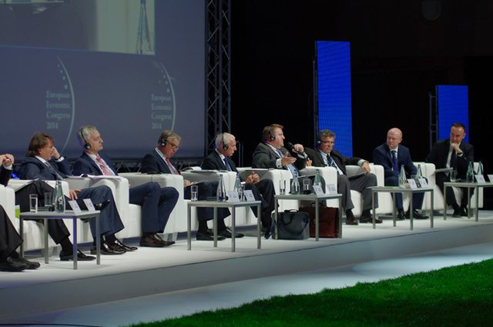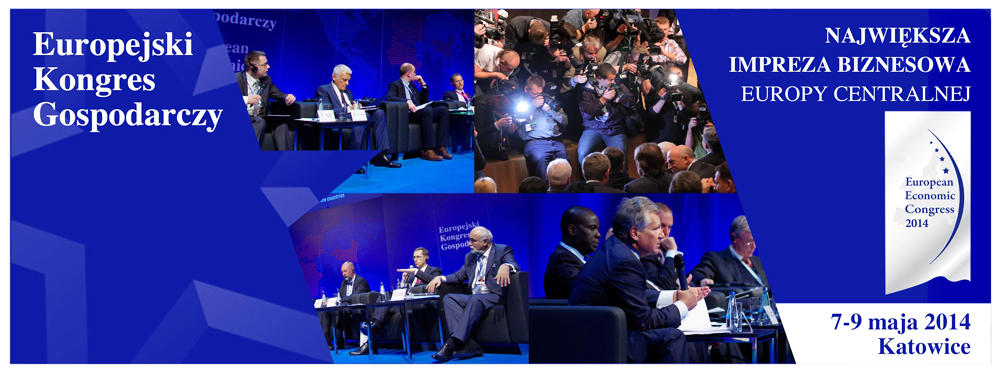During the official opening of European Economic Congress, Prime Minister of the Republic of Poland, Donald Tusk, highlighted the significance of energy security as well as the political security determined by it. The first thematic debate was dedicated to European and global economic cooperation after the decade that passed since the enlargement of EU.
The following discussions touched upon, among others, negotiations regarding Transatlantic Trade and Investment Partnership, the largest global economic agreement. This subject dominated the panel – The European Union – the USA. Partners, Competitors or Both?, whose participants, among others, were: Dan Mullaney, USA’s chief negotiator, Ignacio Garcia Bercero, EU’s chief negotiator, Paweł Olechnowicz, President of the Board and Chief Executive Officer at Grupa Lotos, Chairman of the Board of Directors at CEEP, Mieczysław Nogaj, Head of the Department of Trade Policy in the Ministry of Economy, and Josh Rice, Chief Technology Officer within the Worldwide Public Sector at Microsoft Corporation. Participants of the discussion agreed that the negotiating process would not be an easy one, however properly stipulated agreement might have a very beneficial effect on the economy.
– We are already after four rounds of negotiations. We have presented our positions and objectives for all the issues. We never pretended that the negotiations would be simple and easy. It will be possible to close them before the end of the following year. The fundamental goal is to ensure that the agreement is of good quality, – noticed Ignacio Garcia Bercero, EU’s chief negotiator, whose speech preceded the discussion. Head of the Department of Trade Policy in the Ministry of Economy, Mieczysław Nogaj, emphasised that for Poland crucial were the – negotiated under the agreement – issues related to energy as well as personal data protection or consumers’ protection.
– The challenges resulting from the lack of common market are very similar for different industries. For example, we are all affected by the issues related to rights to property or certification. Undoubtedly a common trade agreement would allow expansion of our service offer.
And this in turn would translate into the opportunity for company’s growth, which would be beneficial for everyone, – said Josh Rice, Chief Technology Officer within the Worldwide Public Sector at Microsoft Corporation. Whereas President of the Board at Grupa Lotos, Paweł Olechnowicz, highlighted in that context the significance of ensuring equal access to energy sources and enabling export of American gas.
The following session was dedicated to the issues related to migration in the contemporary Europe. During this section such topics as the reasons for and implications of the movement of employees within the EU or assimilation-related problems, were discussed.
The following persons participated in the discussion: Zdeněk Bakala, Deputy President and CEO of New World Resources (NWR), co-founder of BXR Group, Member of Programme Board, CEED Institute, Jan Kulczyk, Chairman of Supervisory Board at Kulczyk Investments, Founder of CEED Institute, Indrek Neivelt, Chairman of Supervisory Board at Bank of Saint Petersburg, Chairman of Supervisory Board at Ldiamon, Member of Programme Board at CEED Institute, Björn Savén, President of IK Investment Partners, William Lacy Swing, Director-General of International Organization for Migration, Arūnas Šikšta, Head of The Vilnius International University Business School, Member of Programme Board at CEED Institute and Pedro Videla, professor from the faculty of economics at IESE Business School.
– The issue of migration, especially in the era of globalisation, is the most urgent matter that needs to be resolved. The problem is that in our mentality the non-economic aspects are more significant that the economic ones, – emphasized Jan Kulczyk, Chairman of Supervisory Board at Kulczyk Investments.
– If we do not shift the emphasis in our thinking from the state-country approach towards larger organizations, then it will be extremely difficult to resolve the migration-related problems – recapitulated this part of congress debates Lech Wałęsa, President of the Republic of Poland within 1990-1995, ambassador of CEED Institute.
At the end of the panel CEED Institute Award was officially handed to the Estonian creators of instant messaging tool – Skype. Jaan Tallinn, developer involved in improving and developing Skype project, accepted it on their behalf.
The evening session, which was the last one held on that day, opened the cycle of congress debates dedicated to industry- and energy-related issues. During the discussion important conclusions regarding reindustrialisation, role of power industry in the development of industry and energy-related policies of EU Member States, were articulated.
Lithuanian Minister of Energy, Jaroslav Neverovič, emphasized that Lithuania supported the idea of Polish government related to establishment of real energy union within the EU. – Next week in Athens an informal meeting of ministers for energy will be held, during which we will discuss this topic and express our endorsement for this initiative. We will discuss the details and wait for the opinion of European Commission which, during the next Summit of Heads of State or Government, will present the report on and proposals for strengthening the energy security.
I think it should present specific information and conclusions, – he said during the European Economic Congress in Katowice.
Jerzy Buzek, former Prime Minister of the Republic of Poland and currently President of the European Parliament, assessed that the arms industry may be one of the drivers of Polish industry.
Włodzimierz Karpiński, Minister of Treasury of the Republic of Poland, said: – The psychologist Abraham Maslow used to say that sense of security was one of the most basic human needs. Today energy security has become also an important aspect of the sense of security. Large-scale investments of power companies, in which the Treasury holds a substantial share, increase this security, using local fuels and keeping at the same time high environmental norms, high efficiency rates and basing on the domestic engineering ideas.
– We should not create solutions that move the business outside the EU. We have to ensure opportunities for development of the industry inside EU and for creation of new jobs, thanks to which we will increase our economic independence. We also need to strengthen our energy-related self-sufficiency by using own fuels and diversifying import. We have to talk about diversification of the supplies of energy sources, but not because we do not like somebody, but simply because it is a healthy approach – added Paweł Olechnowicz, President of the Board and CEO of Grupa Lotos.
Source: The European Economic Congress press release



